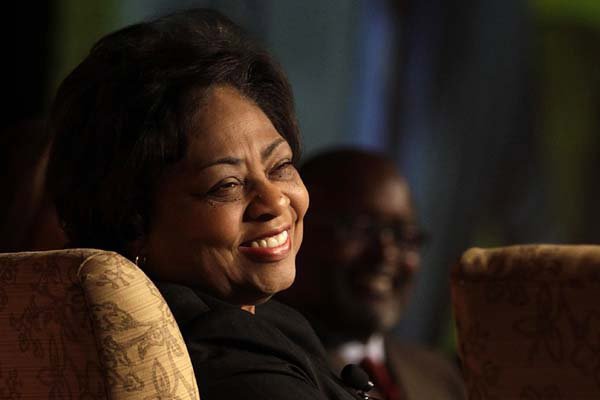SAN DIEGO — Fired U.S. Agriculture Department employee Shirley Sherrod, speaking Thursday at a convention of black journalists, said she hopes her story will be a catalyst for racial dialogue and that she intends to sue the conservative activist whose blog post of an out-of-context video led to her ouster.
“I definitely will” sue Andrew Breitbart, Sherrod said at the National Association of Black Journalists convention in San Diego. “What do I have to be afraid of?”
In the small part of the video posted on Breitbart’s website, Sherrod, who is black, said she had been reluctant to help a white farmer who sought her aid 24 years ago. In the complete speech, she used the episode to describe how she subsequently recognized that her prejudice was wrong, and ultimately helped the farmer.
Interactive
http://www.arkansas…" onclick="window.open(this.href,'popup','height=650,width=750,scrollbars,resizable'); return false;">The Sherrod situation
Sherrod was initially forced to resign her agency job, but when the true context of the remarks became known, Agriculture Secretary Tom Vilsack apologized to her and offered her a new position at the department in the outreach division.
Breitbart could not immediately be reached for comment Thursday.
Sherrod’s remarks to the convention came the same day President Barack Obama made his most extensive comments to date on Sherrod’s firing, calling it an overreaction to a “bogus controversy” and saying that she “deserves better than what happened last week.”
In a speech to the National Urban League in Washington, Obama accepted some blame for the overreaction on behalf of his administration. But he criticized the initial release of the video of Sherrod’s speech, saying it was “based on selected and deceiving excerpts.”
The president said the story Sherrod told in that speech was “exactly what we need to hear” in America, and he urged the country to have an extended conversation about the biases that everyone holds.
“Rather than jump to conclusions,” he said, “we should all look inward and try to examine what’s in our own hearts.”
In wide-ranging remarksin San Diego, Sherrod talked about the personal toll her firing last week had taken. “I felt like a failure after July 19,” Sherrod said. She said she was still considering the job offer from the Obama administration but would take a position only if it would allow a serious look at economic and racial inequities in rural development.
Sherrod said she thought her situation might have played out differently if many of those involved, including those in the Obama administration, “did a better job understanding the history.”
When asked whether she thought Obama needed a history lesson, she said, “Well, yes, I think he does, that’s why I invited him to Georgia.” She said she wants Obama to see that there’s reason for hope but also that “we don’t get along the way we should. He should come down and see that firsthand.”
Asked about Vilsack, she initially hesitated, then said, “Maybe if the secretary had some African-Americans around him, then maybe he would have been able to see” the whole picture and not have rushed to judgment.
In the wake of the Sherrod story, some pundits have urged Obama to begin a national conversation on race, much as he called for in his race speech during the 2008 campaign.
But Obama said Thursday that the discussion is not one that should take place among politicians or on cable television.
Instead, he said, the conversation should take place “around kitchen tables, and water coolers and in church basements and in our schools.”
Obama was asked in an interview on the ABC program The View that aired Thursday whether race is still a major issue in America.
“Of course there’s still tensions out there, there’s still inequalities out there, there’s still discrimination out there, but we’ve made progress,” he said.
“A 24/7 media cycle that’s always looking for controversy” doesn’t always “get to the facts first” and generated “a phony controversy,” Obama said in reference to the episode with Sherrod. “A lot of people overreacted, including people in my administration.” Information for this article was contributed from San Diego by Joe Davidson of The Washington Post and from New York by Roger Runningen of Bloomberg News.
Front Section, Pages 5 on 07/30/2010

